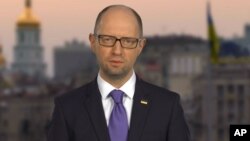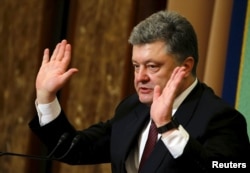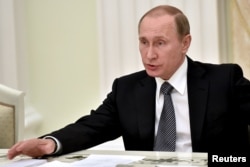The resignation of Ukraine's embattled Prime Minister Arseniy Yatsenyuk, made official Tuesday, raises hopes for ending a political crisis that has delayed Western financial support and led many to question Ukraine’s path to reform.
The current speaker of Ukraine’s parliament, Volodymyr Groysman, is widely expected to be elected as Yatsenyuk’s successor. Unlike Yatsenyuk, he is a close ally of President Petro Poroshenko and a member of Poroshenko's party.
But Ukrainian media reported Tuesday that a parliamentary vote on a new cabinet, including a new prime minister, has been delayed by disagreements over key ministerial positions.
Critics say if President Petro Poroshenko consolidates power in the new government, it could signal a step backward on Ukraine’s path to Europe.
Piotr Bourkovsky is head of the department for political systems development at Kyiv's National Institute for Strategic Studies, a think tank under the presidential office.
"Consolidation [of power] itself is not a dangerous thing,” he tells VOA. “What is dangerous is whether this consolidation would be used for making profits or whether it would be used for moving forward the country."
Pressure to reform?
Yatsenyuk was the latest, and highest profile, official to resign in recent weeks, amid charges that reforms are being implemented too slowly. Economy Minister Aivaras Abromavicius abruptly resigned in February, citing political pressure from parliamentarians to appoint their loyalists to key positions in state-owned enterprises.
In announcing his intention to step down Sunday, Yatsenyuk accused Ukrainian politicians of failing to make “real changes.”
But Yatsenyuk had lost much public support over the government’s handling of reforms and clashed publicly with Poroshenko in February, when the president first asked him and Prosecutor General Viktor Shokin to resign. Shokin, whose office had long been accused of catering to vested interests, submitted his resignation, which was approved in March. Yatsenyuk survived a vote of no confidence, but pressure grew for him to step down.
A consolidation of Poroshenko’s power could also help bring about much-needed reforms by putting the responsibility and pressure to deliver more directly on the president and his party.
U.S. Ambassador to Ukraine Geoffrey Pyatt told journalists Tuesday a promised $1 billion in U.S. financial support would be kept on hold until a cabinet of reformists was in place.
“It’s not just U.S. assistance, but assistance from the IMF, assistance from the European Union,” he said in a press release. “All of this depends on the identification of a new Cabinet with clear reform credentials, and in the case of the United States, continued progress on other critical reform benchmarks, including significantly the selection of a new prosecutor general who enjoys the support and confidence of the Ukrainian people, the Rada, and civil society."
Russian view
Yatsenyuk was much disliked in Russia as one of the political leaders who backed the 2013-2014 uprising that overthrew Ukraine's Kremlin-backed then-president, Viktor Yanukovich. During the transition, when Kyiv was weak, Russia responded by annexing Crimea and launching support for separatist rebels in the Donbas.
Analysts say the government shake-up could spur progress with the Kremlin on the Minsk peace agreement to end fighting with Russia-backed rebels in Ukraine's Donbas region. The deal calls for broad autonomy for the southeast region, legitimate elections, and a return of border control to Ukrainian forces.
But a lack of political will on both sides, amid sporadic armed clashes, has so far slowed implementation.
”Putin always prefers more centralized kind of power,” says the Carnegie Moscow Center’s Alexander Baunov, referring to Russian President Vladimir Putin. “So, for him, Ukraine will be more understandable from the point of view who is leading the country."
But political analysts say Putin does not want to see a strengthened government in Ukraine.
"If we see that this resignation and replacement will lead to a continuation of political crisis,” says Baunov, “that's actually the dream in the Kremlin - to see the big scale, internal political crisis and economic crisis of Ukraine, because that supports the [Kremlin] thesis that revolutions and so abrupt change of power doesn't lead to anything good.”


